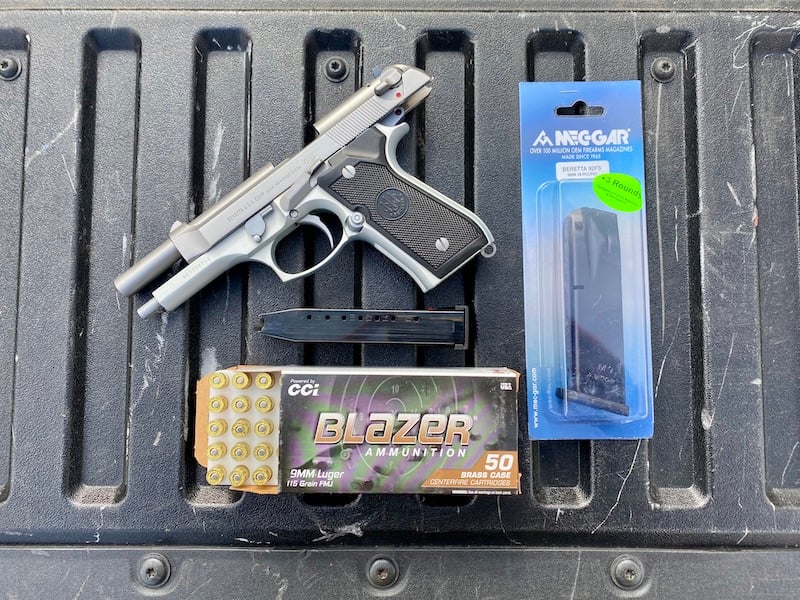Looking for a few extra rounds in your Beretta? Of course, you are. The 92 family typically ships with 15-round magazines, but there’s room in that mag body for more—and that’s where the Mec-Gar Beretta 92FS M9 9mm 18-Round Anti-Friction Magazine shines.
These 18-round mags add three extra rounds without adding any length to the magazine itself. The steel mags are built to withstand the abuse expected of an M9.
Specifications:
- Compatible Firearms: BERETTA 92 and M9 series of pistols
- Caliber: 9mm
- Capacity: 18 rounds (+3 rounds compared to factory magazines and still flush fit)
- Coating: Anti-Friction
- Follower: High-impact polymer
- Tube: Heat treated carbon steel
- Spring: High tensile music wire
- Floorplate: High-impact polymer that sits flush with the pistol
There are two special notes—this mag won’t work with the 92s pistols. This is the model with the mag catch at the heel of the grip. There are very few of them on this side of the Atlantic.
The other is a bit more subtle. Mec-Gar, in its marketing materials, calls attention to this feature: “Anti-Friction coating allows for easy loading, reduced malfunctions, and superior anti-corrosion properties.

Why Anti-Friction?
This is a sordid and twisted tale best suited for business school case studies in public relations.
Shortly after American troops went back to war in Iraq and Afghanistan, the M9 came under increased scrutiny for a variety of failures. Chief among them was a complaint about the magazines.
During the early implementation of this platform, the US government ordered M9 magazines from Checkmate. This is a company known for making reliable magazines. What I’m about to write may look like I’m throwing Checkmate under the bus; nothing could be further from the truth. Checkmate makes great mags — mags we sell and stand behind.
Here’s where the controversy starts. Checkmate maintains that they were delivered specs from Uncle Sam—specs they used to build their mags. These specs, though, were not developed for the environment in which the M9 was deployed in the early 2000s. These specs were a holdover from an earlier theater of operation: Europe.
Let’s Call it Mil-Spec
The Checkmate mags had a phosphate coating that worked well in the wet conditions of European forests. The coating on the inside of the mag prevented rust. This was good.
In the desert, where rust is less of a problem, there was a new enemy: sand. The rough internal coating of these specific mags caught bits of dirt and sand. Because tolerances were tight, this sand often locked up a follower.
Chamber a round, though, and the remaining rounds in the magazine might not advance. The follower, locked in place by sand or debris (holding against the phosphate coating), wouldn’t move up. This was bad.
The phenomenon was often described as a baby rattle. If the follower hung up, the remaining rounds would shake inside the magazine body.
This wasn’t Beretta’s fault. Though they were blamed for the issue, it wasn’t their magazine that was experiencing the issue.
Shake, Rattle and Roll
Checkmate rightly pointed out that they built the magazines to the specs they were given and not to their own specifications. Those with even a cursory understanding of the issue began blaming Checkmate and wrongly assumed the M9 mag issue was a reflection of the quality of the brand itself. Not so. I have many Checkmate mags and they run flawlessly.
The reality of this was hell for Beretta. Many people wrote off the M9 (and Beretta) because the magazine failures meant the gun failed. This reputation spread far and wide. Many people still remember that the M9 failed, but can’t even begin to tell you why.

Enter Mec-Gar
While this was a PR nightmare for Checkmate, too, it was a win for Mec-Gar. Like Checkmate, Mec-Gar makes magazines. Metalwork is their specialty. Many manufacturers turn to Mec-Gar to produce the mags they ship with their guns. Many more of us rely on the company to produce the extra mags we use to keep our guns running.
And Mec-Gar had made some of the earliest M9 magazines. Soldiers began having friends back home seek out these mags and mail them east. And the reputation of Mec-Gar grew.
As there’s no lingering bad publicity about Mec-Gar M9 mags, the company can do creative things—like build a flush-fit mag that will hold three extra rounds.
The Mec-Gar mags do feel slick. They drop free easily. It is late fall in the south and things are wet and muddy. While it isn’t sand, mud can gum up the works.
I had no issues with jams or feeding. The mags worked exceptionally well. I’ve been working with this mag for more than a month now on regular range trips and it does exactly what a magazine should.

Mec-Gar’s Anti-Friction
Odds are, this is a phosphate coating. It wasn’t phosphate that caused the problem but the texture of the phosphate in those early magazines. This is smooth as silk, even when the spring is compressed down under the load of 18 rounds.
Mec-Gar simply calls the finish Anti-Friction. This works. It works in the field and it works for marketing, as the keyword link is less obvious.

18 Rounds
The last words I’ll impart here on the round count may not even be necessary. I’ll write them anyhow. If you are accustomed to working with a set number of rounds in a magazine, having extra may throw you off. I have a 7-round cylinder on a .357 and it seems alien every time I shoot it.
I remember, more than two decades ago now, a 1911 with an 8-round magazine. I’d been at the range all day, had run up a high round count, and was tired.
As I was finishing up, I slapped in a mag, fired my last seven rounds—all of which I’d been counting subconsciously—and then went to reholster the empty gun. When I noticed that the hammer was still back, I assumed that the slide had failed to lock back.
When I dropped the hammer, the gun did what loaded guns do. Stupid? Most assuredly so. I knew the rules, and luckily had the gun pointed in a safe direction, but that doesn’t change any aspect of what was a truly negligent discharge.
I tend to lose count of rounds once I get past the 11th or 12th, even when I’m thinking about it—so I didn’t find the extra rounds here to be anything other than an asset.
After all—as Mec-Gar knows—if 15 is good, 18 is better.


